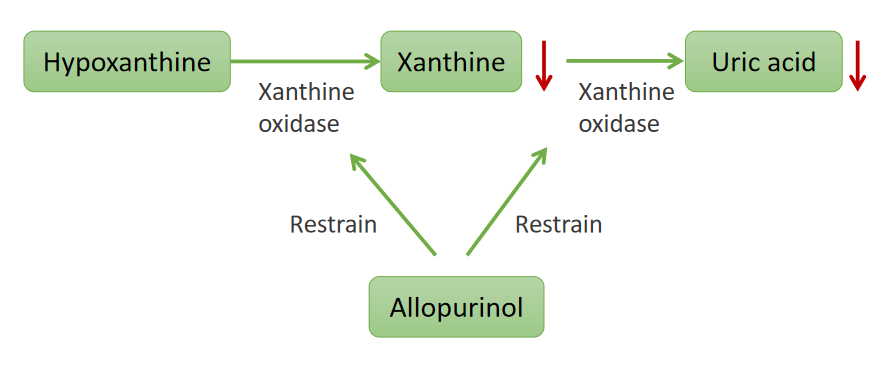Genetic testing for urico-lowering drug | is recommended before allopurinol is used to predict adver
Date:2023-04-01
In recent years, the incidence of high uric acid is on the rise in China. The latest data show that the scale of hyperuricemia patients in China has reached 180 million, and gout has become the second largest metabolic disease after diabetes in China, which is a health warning that cannot be ignored.
Allopurinol, a drug that lowers uric acid
Hyperuricemia and gout are metabolic diseases caused by purine metabolism disorders. At present, the drugs commonly used in clinical uric acid reduction include allopurinol, febuxostat and benzenbromarone.
Allopurinol, a xanthine oxidase inhibitor, is a first-line drug for lowering uric acid with the longest market time, low price and positive efficacy.

Mechanism of allopurinol in lowering uric acid
The basic pharmacological effect of allopurinol is to competitively inhibit xanthine oxidase and block the conversion of hypoxanthine and xanthine to uric acid, while allopurinol is oxidized to hydroxypurinol, which also plays a major role in reducing the concentration of uric acid in the blood.
Beware of adverse effects of allopurinol
The State Drug Administration revised the instructions for allopurinol in 2013, adding a black box reminder:


The common adverse reactions of allopurinol are gastrointestinal reactions, and the most important adverse reactions are hypersensitivity reactions such as fatal exfoliative dermatitis. Once they occur, the fatality rate is up to 30%. If a rash appears during the course of taking the medicine, please stop immediately and go to the dermatology department in time.
The serious adverse reactions caused by allopurinol are related to HLA-B*5801 gene
The HLA-B*5801 allele positive rate in Asian population, especially in Chinese Han population is about 8% (in European and American population, the HLA-B*5801 allele positive rate is only about 1.4%). Therefore, the incidence of allergic drug eruption and other serious adverse reactions after taking allopurinol in Chinese Han population is higher, which has become one of the important concerns.
Genetic tests predict allopurinol adverse reactions
Pharmacogenomic preventive testing is conducive to warning or early diagnosis of adverse reactions caused by allopurinol. HLA-B*5801 gene testing before taking drugs can greatly reduce or even avoid severe allergic reactions caused by allopurinol. If the HLA-B*5801 gene test is positive, allopurinol should be avoided as far as possible to improve the safety of the drug.
MerlinBiomedical offers allopurinol testing to provide scientific guidance for your personalized medicine.
Allopurinol medication reminder
① Pay attention to individual differences and special groups, such as the elderly, renal insufficiency should adjust the dose.
② Pay attention to the dose, the first dose should be small, and then gradually adjust the dose.
③ Allopurinol and ampicillin, warfarin, diuretics and other drugs should not be used at the same time.
Allopurinol should not be used during gout attacks, which can cause uric acid levels to fluctuate and may aggravate attacks.


